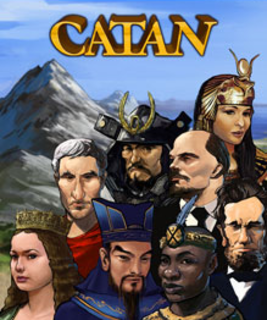I cannot help but wonder why a game like this would have been made at all...
The problem, when you boil it down, is how the player relates to the game. Firstly, note that every aspect of the physical game is reproduced, from dice being rolled, to the actual cards that represent each player’s resources. In fact, the computer game is as near as I can tell a verbatim copy. However, this also implies that Big Huge Games has made what appears to be a potentially dangerous mistake, in assuming that the difference between a board game, and a board game on the computer, is as simple as the medium upon which it is produced. Now, I’m not suggesting that this game should have flasher graphics or animation (the graphics, as I’ve mentioned, are quite pretty). Rather, that the makers seem to have ignored what appears to be a fundamental concept; When you play a board game, you have direct control over everything that happens, because at the end of the day, that board game takes place within the same physical space as yourself. Alternatively, in a computer game, all of our actions (stemming from our intended actions) are choreographed via (in this case) the computer’s capacity to transform our intentions into meaningful events, that take place on the screen. Moreover, that each of those intended actions is implemented via some kind of controlling mechanism, be that keyboard and mouse, or in this case, the Xbox360 controller.
Now consider this: The Settlers of Catan board game is already quite complex, but by having that direct physical access to everything on the board at once, and sitting across from the other participants in your game, everything becomes quite accessible. Even if there’s a lot of counting going on, and things scribbled on paper (it never hurt Risk or Scrabble either), each participant can still easily trade, build, or play special cards by just doing it. Now, alternatively on the Xbox360 version, while all those actions are still open and available to the player, now they have to move through a jungle of intermediary screens, selections, options, and menus. In short, the game is the same, but a hundred times more difficult to play. In terms of player interaction, where this game fails (I presume this may be the case especially for people who have played the original) is in making it overly difficult for the player to affect their intended actions. By putting the build and trade menus so far out of the way, not only is the sensation of direct interaction with the game diminished considerably, but worse, the player can at times feel as though the actions that take place on screen are entirely unrelated to the actions that they are performing in the physical sense. Generally speaking, when a game makes it more difficult for a player to carry out their intended actions than it should have been, the immediate result is not only a loss of agency, but similarly of immersion. Which isn’t really a good place to be for any game (let alone one in which you really need to be paying attention to everything that takes place, all the time).
Another major shortcoming in Big Huge Game’s implementation is that the game doesn’t really seem to appreciate from where its source material is coming from. Admittedly, The Settlers of Catan board game is pretty complex, and so to capture that in a computerised version couldn’t have been easy. But at the same time, the level of complexity in the board game obviously exists because to an extent, it is attempting to emulate the kind of play that you can find in resource managing computer games. But rather than looking at the intent of the original game, and designing something that captures the same style and feel of play, the computer game version attempts to superimpose its own sensibility on top of what is obviously a system designed to accommodate a computer game aesthetic using physical tokens. The overall impression is of something translated from English to Japanese, and then back to English: You can sometimes make out what the author’s trying to say, but for the most part, you really have no idea why.
It seems as though whether or not somebody really sticks with this implementation depends entirely on how desperately they want to play against other people. If the need to play against your mate in New Zealand outweighs the problems in the game’s interface, then it might be something you come back to. But having said this, I cannot in honesty see how this particular kind of person wouldn’t already own the board game. In terms of somebody coming to this game for the first time, not only would it seem needlessly frustrating and complex, but in places it might not seem to make any sense at all. For example, when the die roll a seven, if you have eight or more cards, you dump half of them. It’s a rule of the game, and is fair enough if you might actually run out of cards, but in a computer game, where that’s not really a problem, it just doesn’t make any sense.
Clearly I find this game frustrating. Not only because it apparently fails to understand the medium upon which it is produced, but also because it just doesn’t offer anything that you couldn’t have in the original, asides from playing with people overseas. Even this seems to be at the expense of what is, I believe, the best part of playing a board game: the tactility of the experience. While it’s probable that a lot of people are going to try and love this game, it seems to me that there’s probably a more substantial number who would get more out of the whole experience if they bought the board game, and invited a bunch of mates over for the evening.

